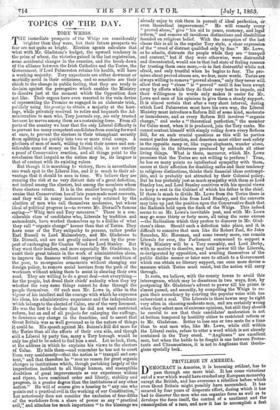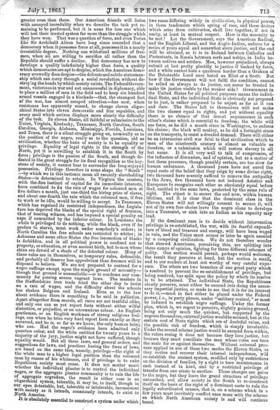PRriTILEGE IN AMERICA. D EMOCRACY in America, it is becoming evident,
has to pass through one more trial. It has come victorious out of a war which would have crushed any European monarch) except the British, and has overcome a rebellion before which even Great Britain might possibly have succumbed. It has secured by four years of desperate effort, during which it has had to discover the men who can organize force as well as to develops the force itself, the control of a continent and the emancipation of a race, and now it has to accomplish a feat greater even than these. Our American friends will listen with annoyed incredulity when we describe the task yet re- maining to be performed, but it is none the less one which will test their trusted system far more than the struggle which they have won. That was a question of force, and even Tories like Sir Archibald Alison have long since conceded that a democracy when it possesses force at all, possesses it in a nearly irresistible degree. Nothing can withstand millions of free- men, when all are willing to sacrifice all rather than the Republic should suffer a decline. But democracy has now to develope a quality indefinitely higher than force, a quality which democracies are apt to despise, which the American demo- cracy avowedly does despise—the delicate and subtle statesman- ship which can carry through a social revolution without de- stroy'ng the bonds by which society exists. The FederalGovern- ment, victorious in war and not unsuccessful in diplomacy, able to place a million of men in the field and to keep six hundred armed vessels engaged in a blockade—that, the strangest fact of the war, has almost escaped attention—has now, when resistance has apparently ceased, to change eleven oligar- chical States into eleven democratic and free republics, and every mail which arrives displays more clearly the difficulty of the task. In eleven States, all faithful or submissive to the Union, Virginia, Kentucky, Tennessee, North Carolina, South Carolina, Georgia, Alabama Mississippi, Florida, Louisiana, and Texas, there is a silent struggle going on, nominally as to the position of the negro really as to the question, old as civilization, whether the basis of society is to be equality or privilege. Equality of legal rights is the strength of the North, yet it is unwilling to establish it in the South by force ; privilege is the passion of the South, and though de- feated in the great struggle for its final recognition as the key- stone of society, it cannot bear to surrender the long-enjoyed possession. Privilege therefore in some shape the "South" —by which we in this instance mean all recently slaveholding States—is determined to • retain. In Virginia the masters, with the.fine instinct of capital for its immediate interests, have combined to fix the rate of wages for coloured men at five dollars a month, just one-third the hiring price of slaves, and about one-fourth the rate which the coloured men, if free to work or be idle, would be willing to accept. In Tennessee, which has regained its restricted independence, the Legisla- ture has deprived the blacks of the special right of freemen, that of bearing witness, and has imposed a special penalty on rape if committed by the inferior colour. In Louisiana the white is privileged to do nothing, while the black, even if he prefers to starve, must work under somebody's orders ; in North Carolina the free schools are restricted to whites ; in Arkansas and some other States the free locomotion of blacks 'is forbidden, and in all political power is confined not to property, or education, or even ancient birth, but to men whose skins are devoid of a shade of the detested colour. Many of these rules are in themselves, as temporary rules, defensible, and probably all deserve less opprobrium than freemen will be disposed to believe. We are not prepared to contend for a negro suffrage except upon the simple ground of necessity— though that ground is unassailable—or to condemn any com- munity for passing severe vagrant laws. The masters in the Staffordshire iron trade tried the other day to insist en a rate of wages, and the difficulty about the schools has shaken Belgium and Ireland. Even as to the law about evidence there is something to be said in palliation. Apart altogether from morals, all races are not truthful alike, and only one can as yet report facts without either wilful distortion, or prejudice, or an unconscious colour. An English gentleman, or an English workman of strong religious feel- ings, can when he tries very hard report facts exactly as they occurred, and he is, so far as we know, the only human being who can. Had the negro's evidence been admitted only quantum valeat, and the white entitled for twenty years to a majority of the jury, justice might not have suffered, though equality would. But all these laws and general orders, and suggestions for laws, and practices having the force of laws, are based on the same idea, namely, privilege—the right of 'the white man to a higher legal position than the coloured man by reason of his whiteness, and if privilege is to exist Republican society must cease. It does not matter much whether the individual planter is to control the individual negro, or the aggregate planter community is to rule the life Of aggregate negrodom, the result in either case is an oligarchical system, tolerable, it may be, in itself, though in our eyes detestable, bat, tolerable or intolerable, inconsistent with society as it intends, consciously intends, to exist in North America.
It is absolutely essential to construct a system under which two races differing widely in civilization, in physical power, in those tendencies which spring of race, and those desires which arise from cultivation, shall live together, if not in amity, at least in mutual respect. How is the necessity to be met ? Let the Government, says the American Radical, and the English Liberal, and the Anglo-Indian, enforce for a series of years equal and somewhat stern justice, and the end will be attained, as it is in Ireland between Catholics and Protestants, in Russia between serfs and nobles, in India be- tween natives and settlers. Men, however prejudiced, always submit at last pretty placidly to justice if backed by force, and a white cannot hate a quadroon harder than a Graham of the Debateable Land once hated an Eliot or a Scott. But how if the Government will not fulfil the condition, cannot be relied on always to do justice, can never be trusted to make its justice visible to the weaker side ? Government in the United States for all political purposes means the indivi- dual State, and the individual State is obviously not prepared to be just, is rather prepared to be unjust as far as it can and dare. The States left to themselves will not make the two classes equal in rights, and yet without equality there is no chance of that decent acquiescence in each other's claims which is essential to freedom; the white will.
use force, as he did a month since in Washington, to enforce his claims ; the black will mutiny, as he did a fortnight since on the transports, to resist a dreaded demand. There will either be an internecine civil war fatal to that civilization which to men of the nineteenth century is almost as valuable as freedom, or a submission which will restore slavery in all but name. It is all very well to talk of compromise, of the influence of discussion, and of opinion, but as a matter of fact these processes, though possibly certain, are too slow for human endurance. I thousand years have not cured the royal caste of the belief that they reign by some divine right, two thousand have scarcely sufficed to remove the antipathy to the Jews, five thousand have not induced Asiatics and Europeans to recognize each other as absolutely equal before God, entitled to the same laws, protected by the same rule of right. The object is to secure the end now, within human lifetime, and it is clear that the dominant class in the Eleven States will not willingly consent to secure it, will not of its own free choice leave the negro alone to des-elope into a Toussaint, or sink into an Indian as his capacity may lead.
If the dominant race is to decide without intervention privilege is re-established, the war, with its fearful expendi- ture of blood and treasure and energy, will have been waged in vain, and the Union must sooner or later be again assailed by a competing civilization. We do not therefore wonder that shrewd Americans, perceiving this, are splitting into three camps of opinion, fighting for three different schemes of polity. One section would permit, perhaps would welcome, the result they perceive at hand, but the section is small, and to our readers at least not worthy of very careful expo- sure. The others are two branches of one great party which is resolved to prevent the re-establishment of privilege, but being resolved, has split upon the policy by which its resolve is to be attained. The individual State, the Republicans clearly perceive, must either be coerced into doing the neces- sary impartial justice, or made to see that it is for its interest to do it,—must in fact either be placed under the Federal power, 1. e., in party phrase, under "military control," or must be induced to establish negro suffrage. Under the former plan, which is, we regret to perceive, slightly gaining ground, being not only much the quicker, but supported by the negroes themselves, external justice would be secured, but at the certain cost of State rights which are of doubtful value, and the possible risk of freedom, which is simply invaluable. Under the second scheme justice would be secured from within, the rulers seeing it done not because they love justice, but because they must conciliate the men whose votes can turn the scale for or against themselves. Without external pres- sure applied in one of these two modes the Eleven States, as they revive and recover their internal independence, will re-establish the ancient system, modified only by restrictions on the division of families, by a right to bare maintenance in cash instead of in kind, and by a restricted privilege of transfer from one estate to another. Those changes are gains to the negro, but they leave the grand structure of privilege untouched, and allow society in the South to re-construct itself on the basis of the right of a dominant caste to rule the legally subordinated masses, that is, on a scheme which in a few years must inevitably conflict once more with the scheme on which North American society is and will continue based.































 Previous page
Previous page